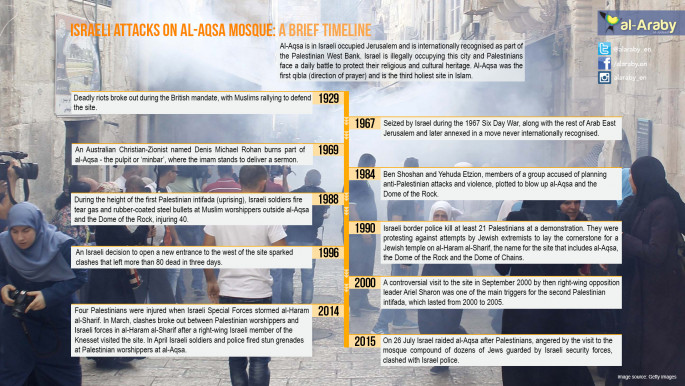The Second Intifada, 15 years on
Unrest and tension had been brewing for some time in the occupied territories, but it was Sharon's visit to al-Aqsa - accompanied by hundreds of heavily armed riot police - that was the final straw.
Now, a decade and a half later, incursions by Israeli leaders and soldiers into Islam's third-holiest site have become almost a routine, ordinary affair.
Little backlash is triggered across the occupied territories, save for the limited resistance activists and worshippers put up at the al-Aqsa compound itself.
Fifteen years ago, times were different. The late Palestinian president, Yasser Arafat, endorsed the al-Aqsa intifada, and provided support for the Aqsa Martyrs Brigades - the military wing of the Fatah movement he led.
Arafat became a symbol of the intifada, which practically ended with his alleged poisoning in late 2004.
Not long after, his successor, President Mahmoud Abbas, struck a deal with Sharon in 2005 in Sharm al-Sheikh, ending the Palestinian uprising and disbanding the Aqsa Martyrs Brigades. Abbas would henceforth prohibit armed resistance against the occupation.
| A decade and a half later, incursions by Israeli leaders and soldiers into Islam's third-holiest site have become a routine affair |
Two years later, the split between Fatah and Hamas divided Palestinian society and enabled the Palestinian Authority to tighten its security grip more than ever before.
In parallel, security collaboration with Israeli authorities reached unprecedented levels - especially against Hamas members and activists in the West Bank, but also against elements in Fatah itself that rejected the new reality.
The prospect of a new uprising or organised resistance was all but finished as a result.
The security doctrine of the Palestinian security services is consistent with Abbas' decisions and statements. Abbas has repeatedly vowed not to allow a third intifada during his term, most recently during his meetings with Western heads of states.
Resistance alive and well at al-Aqsa
Resistance in the West Bank is now an individual activity, punishment of which has been rendered disproportionately harsh by both the occupation and the Palestinian Authority.
What is left of the armed resistance in the West Bank has been forced underground as a result.
Al-Aqsa has been the site of violent Israeli incursions, which have caused extensive damage to the compound and left scores of Palestinians injured.
| Resistance in the West Bank is now an individual activity, punished by both the occupation and the Palestinian Authority |
"We have tried to protect our mosque and have succeeded in repelling [the Israelis]," Abu Mujahid, an activist who was involved in previous intifadas, told al-Araby al-Jadeed.
"When they failed, they resorted to vandalism, damaging windows and throwing tear gas and stun grenades inside the Qibli Mosque.
"We will rebuild and repair what they destroyed; al-Aqsa will not be divided," he added.
Al-Araby al-Jadeed met with several activists, mostly elder people, as they cleaned up the courtyards of al-Aqsa from the aftermath of the clashes this week. Next to them stood Sheikh Omar al-Kiswani, director of al-Aqsa Mosque, and guards and volunteers.
The Israeli forces withdrew from the compound but Israeli snipers remain on rooftops overlooking the mosque. Clashes continued outside the compound in the old city, during which four journalists were reportedly injured.
Kiswani is worried about the Israeli actions. He accuses the Israeli forces of deliberately sabotaging the buildings in the compound, and shooting at historical mosaics and columns.
The damage caused by recent Israeli incursions into the mosque has been the worst of recent times. Many of the activists there are worried this is the beginning of a major Israeli escalation against the mosque, as part of a plan to alter the status quo that currently places the mosque under joint Jordanian-Palestinian control, with non-Muslims barred from praying.
According to Hatem Abdul-Qader, a Fatah official in charge of Jerusalem-related affairs, recent Israeli expansion works at the Mughrabi Gate, one of the gates of al-Aqsa Israel has controlled since 1967, will allow heavy Israeli military vehicles to be deployed "easily and smoothly".
| Many fear a repeat of previous Israeli attacks against Palestinian worshippers |
To many observers, this could usher in a new era of Israeli incursions into al-Aqsa, one that could see more violence deployed against buildings in the compounds, as well as the guards and worshippers there.
Many fear a repeat of previous Israeli attacks against Palestinian worshippers.
Hamas: New intifada still possible
In Gaza, Hamas, the Islamic Resistance Movement, marked the 15th anniversary of the start of the al-Aqsa intifada by saying that all the ingredients for a new uprising were in place.
Hamas said no amount of "conpiracy, collusion, arrogance or might" could stop it.
Hamas warned the occupying Israeli authorities against falling into a false sense of security thanks to the state of Arab regimes and their "silence, collusion and collaboration".
Hamas also said any attempt to seize the Aqsa Mosque would fail, and would rally the Palestinian people in the West Bank, Gaza and the diaspora to stage a new intifada.
 |
|
| [Click to enlarge] |
This is an edited translation from our Arabic edition.





 Follow the Middle East's top stories in English at The New Arab on Google News
Follow the Middle East's top stories in English at The New Arab on Google News


